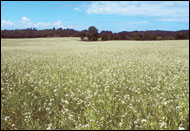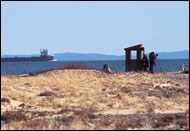Food & Farming / News & Views / Articles from 1995 to 2012 / Groundswells
Groundswells
Dune Defenders Push Pipeline Plug Build It, They Will Ride Cup of TEA, Dash of Daschle The Concerned Citizens for Saugatuck Dunes continue to fight the proposed construction of a water intake pipe and pumping station within Saugatuck Dunes State Park. While CCSD’s main focus is protecting a popular west Michigan destination from industry, this local battle also embodies concerns similar to those the Perrier Group re-ignited when it got a state tax break to withdraw and bottle water from a local aquifer. The state has no laws governing water withdrawals and no planning process for controlling use and distribution. Visit saugatuckdunes.org for more information.
The Concerned Citizens for Saugatuck Dunes continue to fight the proposed construction of a water intake pipe and pumping station within Saugatuck Dunes State Park. While CCSD’s main focus is protecting a popular west Michigan destination from industry, this local battle also embodies concerns similar to those the Perrier Group re-ignited when it got a state tax break to withdraw and bottle water from a local aquifer. The state has no laws governing water withdrawals and no planning process for controlling use and distribution. Visit saugatuckdunes.org for more information.
In 2001 state legislators authorized counties to preserve working farms by purchasing all future development rights from willing farmers. Thirteen Michigan counties are working on “PDR” (purchase of development rights) programs. From Lenawee, Ingham and St. Clair counties, which are beginning the process, to Lapeer, Barry, Clinton, Kent, and Leelanau counties, where preservation boards are defining PDR eligibility, citizens and leaders are moving ahead, even without the state’s promised matching funds. The Agricultural Preservation Fund Board unanimously recommended that Lansing contribute $50 million in annual PDR matching funds; the Institute and the Michigan Farm Bureau membership believe a fee on conversion of farmland to development could provide the revenue. Go to Growth Management/Farmland Protection at mlui.org for more on saving farms. 
Birders, Divers Reach Whitefish Point Accord
Although bird watchers and shipwreck divers rarely cross paths, they crossed swords recently at the Upper Peninsula’s Whitefish Point. The Point provides prime habitat for migrating birds and also shelters a shipwreck museum honoring the nearby Edmund Fitzgerald and other maritime disasters. When the Great Lakes Shipwreck Historical Society announced expansion plans for its museum there, the Michigan Audubon Society sued to protect the crucial aviary rest stop. MLUI planner Jim Lively began mediating a Whitefish Point Management Plan in January 2001. Completed last December, it allows birds, birders, and shipwreck buffs to share one of Michigan’s special places. Our Web search engine, at mlui.org, points to the complete story. 
 In 2000, metropolitan Grand Rapids approved a millage expanding the region’s bus service, The Rapid. Ridership grew 13.2 percent in the first year of millage-financed improvements and 8.8 percent last year — twice the national average. Now Faith In Motion, part of a coalition that pushed the millage, is talking to regional leaders about best times to schedule both renewal and increase requests. FIM says that because The Rapid has kept its promises regarding service improvements, the region is ready to finance further improvements. A study of potential regional rail corridors is already underway. There’s more Web information at ridetherapid.org. Reach FIM at 616-774-9037 or
In 2000, metropolitan Grand Rapids approved a millage expanding the region’s bus service, The Rapid. Ridership grew 13.2 percent in the first year of millage-financed improvements and 8.8 percent last year — twice the national average. Now Faith In Motion, part of a coalition that pushed the millage, is talking to regional leaders about best times to schedule both renewal and increase requests. FIM says that because The Rapid has kept its promises regarding service improvements, the region is ready to finance further improvements. A study of potential regional rail corridors is already underway. There’s more Web information at ridetherapid.org. Reach FIM at 616-774-9037 or
adebraber@graceoffice.org. Republicans controlling Congress have unveiled their national transportation vision: Gut transit funding, build more highways, steamroll environmental laws that stand in the way. Smart Growth advocates are girding for battle on these questions, many of which will be settled when Congress takes up TEA-21, the Transportation Equity Act, which is renewable every six years. Detroiters are joining the fray. Under the auspices of the faith-based advocacy group MOSES, 1,000 people attended a community meeting in Motown and urged U.S. Senator Tom Daschle to pump up transit funds in the Democrats’ economic stimulus package. He promptly did, to the tune of $700 million.
Republicans controlling Congress have unveiled their national transportation vision: Gut transit funding, build more highways, steamroll environmental laws that stand in the way. Smart Growth advocates are girding for battle on these questions, many of which will be settled when Congress takes up TEA-21, the Transportation Equity Act, which is renewable every six years. Detroiters are joining the fray. Under the auspices of the faith-based advocacy group MOSES, 1,000 people attended a community meeting in Motown and urged U.S. Senator Tom Daschle to pump up transit funds in the Democrats’ economic stimulus package. He promptly did, to the tune of $700 million.





